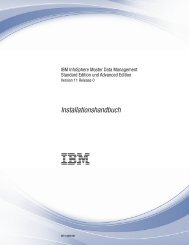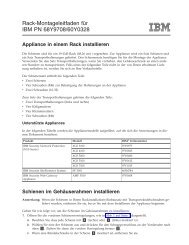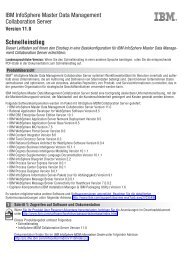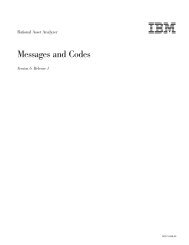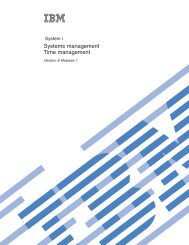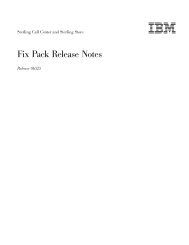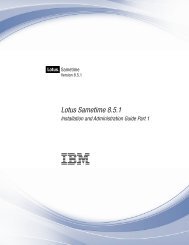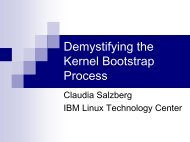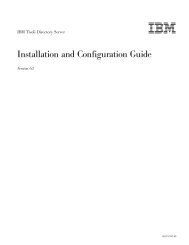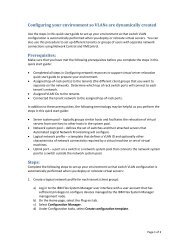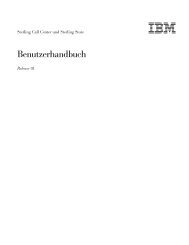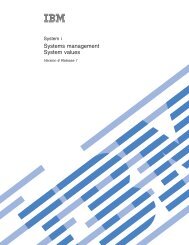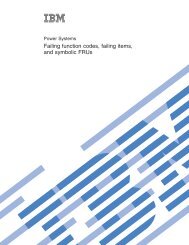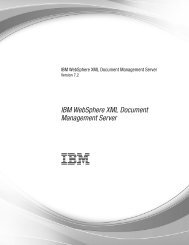System i: Programming Secure Sockets APIs - IBM
System i: Programming Secure Sockets APIs - IBM
System i: Programming Secure Sockets APIs - IBM
You also want an ePaper? Increase the reach of your titles
YUMPU automatically turns print PDFs into web optimized ePapers that Google loves.
[EIO]<br />
[ENOTCONN]<br />
[ENOTSOCK]<br />
[EPIPE]<br />
[EUNATCH]<br />
Input/output error.<br />
Requested operation requires a connection.<br />
The specified descriptor does not reference a socket.<br />
Broken pipe.<br />
The protocol required to support the specified address family is not available at this time.<br />
If an errno is returned that is not in this list, see “Errno Values for UNIX-Type Functions” on page 103 for<br />
a description of the errno.<br />
Error Messages<br />
Message ID Error Message Text<br />
CPE3418 E Possible APAR condition or hardware failure.<br />
CPF9872 E Program or service program &1 in library &2 ended. Reason code &3.<br />
CPFA081 E Unable to set return value or error code.<br />
Usage Notes<br />
1. Since gsk_secure_soc_startSend() is asynchronous, care should be used to control how many of these<br />
functions are outstanding. When a TCP socket becomes flow control blocked such that the<br />
gsk_secure_soc_startSend() is not able to pass the data to the TCP socket immediately, the return<br />
value will be GSK_AS400_ASYNCHRONOUS_SEND. Applications that send large amounts of data<br />
should have the postFlag set to 0. This allows the application to use a return value of<br />
GSK_AS400_ASYNCHRONOUS_SEND as an indication that the socket has become flow control<br />
blocked. The application should then wait for the outstanding operation to complete before issuing<br />
another gsk_secure_soc_startSend(). This will ensure that the application does not exhaust system<br />
buffer resources.<br />
2. A buffer that is given to gsk_secure_soc_startSend() must not be used by the application again until<br />
either it is returned by QsoWaitForIOCompletion() or is reclaimed by issuing a close() on the socket<br />
descriptor or issuing a QsoDestroyIOCompletionPort() on the I/O completion port. If a buffer is given<br />
to gsk_secure_soc_startSend() to be sent, and it is later detected during gsk_secure_soc_startSend()<br />
processing that the buffer has been freed, it may produce an unrecoverable condition on the socket for<br />
which the gsk_secure_soc_startSend() was issued. If this occurs, an ECONNABORTED error value<br />
will be returned.<br />
3. There is no maximum length of data that can be written.<br />
4. It is not recommended to intermix gsk_secure_soc_startSend() and blocking I/O (ie, send() or<br />
gsk_secure_soc_send()) on the same socket. If one does, then pending asynchronous send I/O will be<br />
serviced before blocking I/O once data can be sent.<br />
5. It is strongly suggested that you do not mix the gsk_secure_soc_write() nor<br />
gsk_secure_soc_startSend() <strong>APIs</strong> with any of the sockets write functions. However, SSL and socket<br />
reads and writes can be mixed, but they must be performed in matched sets. If a client application<br />
writes 100 bytes of data using one or more of the socket send() calls, then the server application must<br />
read exactly 100 bytes of data using one or more of the socket recv() calls. This is also true for<br />
gsk_secure_soc_write() and gsk_secure_soc_startSend()<strong>APIs</strong>.<br />
<strong>Secure</strong> <strong>Sockets</strong> <strong>APIs</strong> 59



